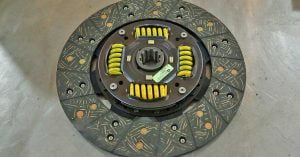 Manual transmissions, once called standard transmissions, are not as popular today as they once were. It carries that name because drivers manually move the transmission through its gear sequence. These transmissions are very different from their automatic counterparts and they also have unique symptoms of wear or malfunction. If you have one, you might be wondering when to replace the clutch on your manual transmission so you don’t get stuck on the side of the road.
Manual transmissions, once called standard transmissions, are not as popular today as they once were. It carries that name because drivers manually move the transmission through its gear sequence. These transmissions are very different from their automatic counterparts and they also have unique symptoms of wear or malfunction. If you have one, you might be wondering when to replace the clutch on your manual transmission so you don’t get stuck on the side of the road.
If you haven’t ever driven a vehicle with a manual transmission, it is not surprising. In fact, only 6.5 percent of new cars sold in the U.S. today have manual transmissions. A manual transmission works with a third pedal that is normally located to the left of the brake pedal. That pedal is pushed down when the shifter in the console is being moved to the next gear, a maneuver that happens very quickly.
Keep in mind the longevity of a clutch is just as dependent on a driver’s driving habits as it is the quality of the part. Geography makes a difference too. Traffic-free highway miles in flat terrain is easy on a clutch. Stop-and-go traffic plus changes of grade which is typical in Colorado will dramatically shorten the life of a clutch.
Symptoms of a Failing Clutch
A clutch problem can feel like a transmission problem, but they are actually distinct parts with unique maintenance requirements.
When a clutch is failing it can: feel chattery when coming off the clutch; make noise when you push the pedal in or out; feels as though it’s slipping like you are not fully engaging gears; or you can have a clutch pedal that is abnormally hard to push down.
If there are problems with the master and the slave cylinder (they work together), the clutch will go all the way to the floor with no resistance.
Keep in mind that the throw-out bearing engages the clutch. The throw-out bearing and pilot bearing, which work together, should be updated when a clutch is being replaced. If there is squealing with the clutch pedal in, that could indicate a problem with both bearings.
With most clutch replacements, we resurface the flywheel, grinding them flat or replacing them if necessary. A dual-mass flywheel requires special attention which is different from the treatment of a conventional flywheel.
When Should I Have my Manual Transmission Checked?
Like most things with your vehicle, if you notice a change in operation you should have it checked. Likewise, if you have any of the symptoms described above, you should make it a priority to bring your car in for an inspection.
Diagnosis of the potential problem requires a condensed version of our TrueTest inspection process. There is no charge for this and our detailed process will provide us the information we need to tell you what needs to be done.
Should I Have the Fluid Changed?
Yes. You should refer to your owner’s manual to find out when it is recommended for your vehicle as each make and model has unique specifications. Fluids for manual transmissions have changed over the years and not all fluids are the same. The interval is dependent upon the type and weight of fluid used in your transmission.
Some manufacturers consider their fluid “lifetime” fluid. While we agree, fluids have improved over the years, we would caution you they will not last forever. In these cases, we recommend the fluid be changed at intervals between 35,000 miles and 50,000 miles, depending on driver habits, geography, fluid type, and vehicle.
Manual transmissions require less fluid than an automatic transmission because the driver is actively engaging gears. It is generally a simpler system that requires fewer electronics and sensors due to the driver’s role in shifting. This reality is not an excuse to skip regular maintenance on your clutch and transmission.
Schedule a Free Diagnosis Today
Call us today and schedule a free diagnosis via our TrueTest Inspection. We provide top-quality workmanship, quick service or repairs, the finest customer satisfaction in the industry, and we are a local business that you can trust. You can also send us a message on our Contact Us page.
Advanced Transmission Center is a Colorado-owned and operated auto repair shop with locations in Denver / Lakewood and Westminster. ATC specializes in driveline issues such as automatic transmission repair, four wheel drive repair, clutch replacement, differentials, manual transmissions and CVT. As Colorado's first AAA approved shop our goal is to provide accurate, timely service with exceptional customer satisfaction. All of our technicians are certified in the latest makes and models and we are one of the few transmission repair shops with a nationwide warranty.



 Free Customer Towing Service
Free Customer Towing Service  Free TrueTest™ Inspection
Free TrueTest™ Inspection  Fast Transmission Services
Fast Transmission Services  Comprehensive Warranty in Denver
Comprehensive Warranty in Denver 


























Pingback: Difference Between Manual and Automatic Transmissions | ATC